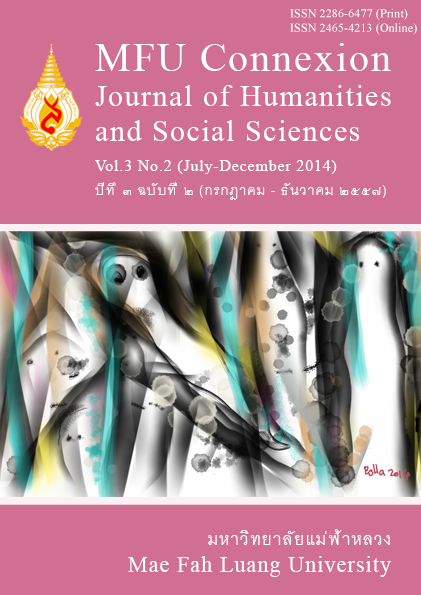การดูแลสุขภาพแบบองค์รวมของผู้สูงอายุตามแนวคิดทางพระพุทธศาสนา
Main Article Content
Abstract
The problems about the elderly’s way of life and self care of themselves at the present time, i.e. the health problem and the economical problem. Both of them caused a further social problem. The development of Buddhist concepts that had effect on the holistic health care was found that in the holistic health care the control of mind and body was very important. The Buddhist concepts dealt with a way of life in three factors-the relation to environment, mind and wisdom. These three factors were called Threefold Training. The applied Buddhist concepts and the elderly’s holistic health care were done for a good way of life. The principle of Threefold Training was possibly divided into development for four Bhavanas. These principles could be taken into a real practice. They really brought about good health in the present time under the concept of holistic health care.
Article Details
Copyright
Connexion: Journal of Humanities and Social Sciences has an exclusive right to publish the accepted articles in any form. However, the author retains the following rights:
1. The right to the ownership of the article;
2. The right to use all or part of the article in his/her other works;
3. The right to re-produce the article for personal use or for use in the author’s organisation, in which case the author must obtain permission from Connexion: Journal of Humanities and Social Sciences;
4. The right to make copies of all or part of the work for educational use or for the author’s use in classroom teaching; and
5. The right to include the work (both the preprinted and printed versions) in an institutional repository.
References
จิราภา เต่งไตรรัตน์. (2547) จิตวิทยาทั่วไป (พิมพ์ครั้งที่ 4), กรุงเทพฯ: โรงพิมพ์มหาวิทยาลัยธรรมศาสตร์.
เชอร์วิน บี นูแลนด์. (2547) เราตายอย่างไร (วเนช แปล) (พิมพ์ครั้งที่ 2), กรุงเทพฯ: เคล็ดไทย.
ถวิล ธาราโรจน์ และคณะ. (2541) จิตวิทยาทั่วไป (พิมพ์ครั้งที่ 2), กรุงเทพฯ: โรงพิมพ์ทิพยฺวิสุทธิ์.
พระครูภาวนาโพธิคุณ. (2552, มิถุนายน-ธันวาคม) ศึกษาตีความสุขภาวะองค์รวมวิถีพุทธ, วารสารพุทธศาสตร์-ปรัชญาปริทรรศน์, 2(1), 2.
พระธรรมกิตติวงศ์. (2550) พจนานุกรมเพื่อการศึกษาพุทธศาสน์ ชุด ศัพท์วิเคราะห์ (พิมพ์ครั้งที่ 2), กรุงเทพฯ: เลี่ยงเชียง.
พระธรรมปิฎก (ป.อ.ปยุตฺโต). (2546) ทุกข์สำหรับเห็น แต่สุขสำหรับเป็น (แก่นแท้ของพระพุทธศาสนา) (พิมพ์ครั้งที่ 9), กรุงเทพฯ: ธรรมสาร.
พระธรรมปิฎก(ประยุทธ์ ปยุตฺโต). (ม.ป.ป.) อายุยืนอย่างมีคุณค่า, กรุงเทพฯ: ธรรมสภา.
พระธรรมสิงหบุราจารย์ (หลวงพ่อจรัญ ฐิตธัมโม). (ม.ป.ป.) หลักประกันชีวิต ทุกลมหายใจใช้เวลาให้เป็นประโยชน์, กรุงเทพฯ: สถาบันบันลือธรรม.
พระพรหมคุณาภรณ์ (ป.อ.ปยุตโต), (2551) พจนานุกรมพุทธศาสน์ ฉบับประมวลศัพท์ (พิมพ์ครั้งที่ 12), กรุงเทพฯ: มหาจุฬาลงกรณราชวิทยาลัย.
พระพรหมคุณาภรณ์ (ป.อ.ปยุตฺโต). (2549) สุขภาวะองค์รวมแนวพุทธ (พิมพ์ครั้งที่ 11), กรุงเทพฯ: สหธรรมิก.
เพ็ญพิไล ฤทธาคณานนท์. (2550) พัฒนาการมนุษย์ (Human Development) (พิมพ์ครั้งที่ 2), กรุงเทพฯ: ศูนย์หนังสือแห่งจุฬาลงกรณ์มหาวิทยาลัย.
มหาจุฬาลงกรณราชวิทยาลัย. (2539) พระไตรปิฎกภาษาไทย (ฉบับมหาจุฬาลงกรณราชวิทยาลัย), กรุงเทพฯ: โรงพิมพ์มหาจุฬาลงกรณราชวิทยาลัย.
ราชบัณฑิตยสถาน. (2546) พจนานุกรม ฉบับราชบัณฑิตยสถาน พ.ศ. 2542, กรุงเทพฯ: นานมีบุ๊คส์พับลิเคชั่น.
วราภรณ์ ตระกูลสฤษดิ์. (ม.ป.ป.) จิตวิทยาการปรับตัว, กรุงเทพฯ: ศูนย์หนังสือจุฬาลงกรณ์มหาวิทยาลัย.
วิชัย โชควิวัฒน์. (2547, 26 พฤศจิกายน) สุขภาวะองค์รวมแนวพุทธ, อ้างถึงใน พระพรหมคุณาภรณ์ (ป.อ.ปยุตฺโต), (2549) สุขภาวะองค์รวมแนวพุทธ (พิมพ์ครั้งที่ 11), กรุงเทพฯ: สหธรรมิก.
ศรีเรือน แก้วกังวาน. (2540) จิตวิทยาพัฒนาการชีวิตทุกช่วงวัย (พิมพ์ครั้งที่ 7), กรุงเทพฯ: สำนักพิมพ์มหาวิทยาลัยธรรมศาสตร์.
Phra Brahmagunabhorn (P. A. Payutto), Psychology in human development the natural way, Bangkok: Mahachulalongkornrajavidyalaya University.
Suchint Phalakornkule and Saowalos Tongpan. (1992) Elderly in Thailand, Productive Aging in Asia and the Pacific, Asian Population Studies Series. No. 129, 100-104.


